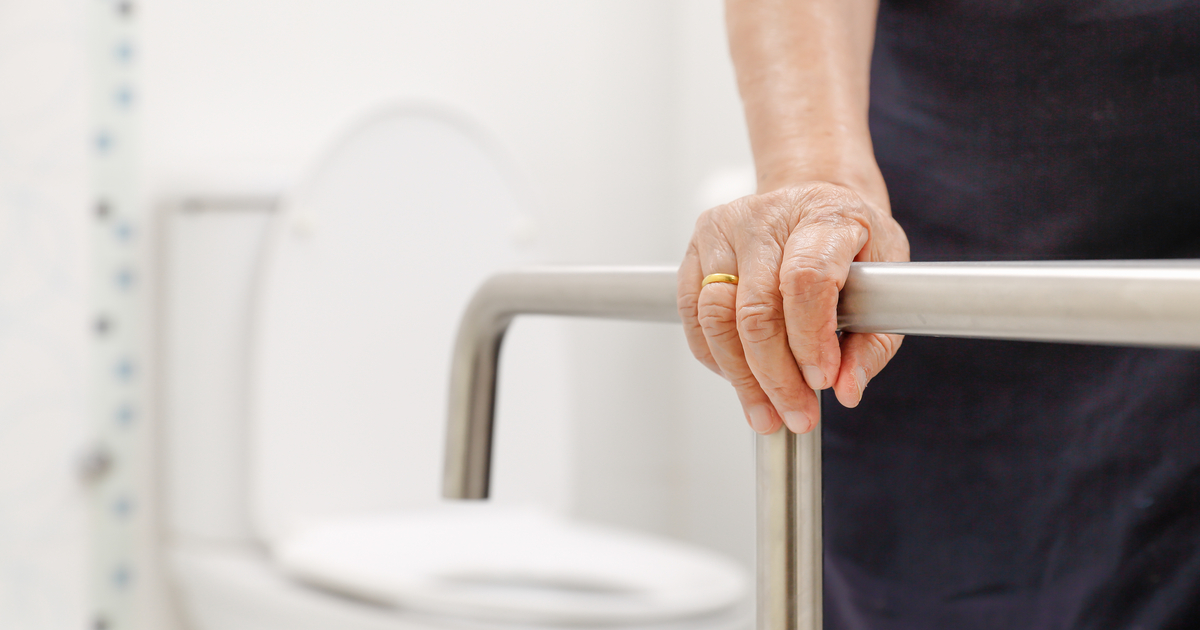For reasons like dementia, disabilities and chronic illnesses many adult children end up assisting their elderly parents with their toileting needs. When placed in this role reversal situation helping mom or dad use the bathroom can be embarrassing and uncomfortable.
Dealing with incontinence issues can be even more challenging. Using these toileting assistance tips will allow your parents to maintain their independence with dignity.
Toileting Challenges that Seniors Face
Some seniors can’t make it to the bathroom on time because of dementia or poor mobility. In addition to those issues, the elderly oftentimes face these toileting challenges:
- Urinary or bowel incontinence
- Balance and coordination problems
- Poor eyesight
- Diminished muscle strength
- Reduced flexibility
- Dizziness caused by low blood pressure (hypotension) upon exertion
Many seniors are afraid to fall while in the bathroom, and for good reason. Bathroom accidents are the leading cause of in-home falls and fractures in the aging population every year.
Toileting Tips for Informal Caregivers
As an informal caregiver, helping your aging parents age gracefully in place with dignity is possible by addressing their toileting needs in these ways:
Have an honest conversation
Sit down and respectfully discuss your concerns with your parents, along with ways that you can help. It might be as simple as installing grab bars next to the toilet or finding them some discrete disposable undergarments. During the toileting conversation don’t talk down to your parents or use a threatening tone.
Put safety first
Not knowing how to safely lift or transfer another adult will place you both at risk. While serving as balance support, encourage mom or dad to move as much on their own as possible. Never lift your loved one outright or ask them to pull on you for leverage. To stabilize them, hold onto their trunk and hips. Avoid pulling on legs or arms, and always bend at your knees.
Communicate clearly
While transferring your parent on and off the toilet use short sentences to explain the next step. For example, say: “The toilet seat is right behind you. Squat down slowly to sit.” Or “I’m going to help you stand up now. Scoot your butt forward on the seat. Lean forward and put your hands on my forearms when you are ready.”
Plan ahead
For someone who’s confused or disabled getting safely to the bathroom takes time. To reduce the likelihood for an urgency accident plan on regular trips to the bathroom, like right after meals. If urinary incontinence is an issue limit their intake of caffeine-containing beverages, especially in the evening.
Getting to the bathroom
While escorting your parent to the bathroom let them walk at their own pace and stay at their side in case they trip or falter. Once they’re near the toilet ask them to slowly turn around by taking small steps until the toilet is directly behind them. If they have trouble walking on their own getting them an assistive device is a good idea.
Sitting on the toilet
Ask your parent to place their hands on your forearms before slowly lowering themselves onto the toilet seat. Steady them by placing your hands on their trunk and bending your knees as they lower themselves. If they use a walker, don’t let them hold onto it while sitting down or standing up because it could tip over. A raised toilet seat is also beneficial for seniors.
Seek outside assistance
If you’re still a little unsure about what you’re doing, a geriatric care manager or occupational therapist can provide senior toileting and incontinence care training. If you have your own limitations, consider hiring a professional caregiver from a licensed home care agency to assist your parents with their toileting needs.
In-Home Toileting Assistance for Seniors in Southern California
At New Wave Home Care, we know a thing or two about assisting seniors with their toileting needs. As a home care provider our approach is all about compassion and connection, delivered with a personal touch that allows our clients to experience a degree of joy. Our highly trained professionals go above and beyond in their dedication to providing care for others, while making a difference in the lives of those we serve.
We support clients and their families with personalized in-home care solutions like transitional care, personal care, medication reminders, specialized care, respite care, dementia and Alzheimer’s care, hospice support and more. At New Wave Home Care, it’s not just about caregiving. It’s about heart! To learn more now about why we are a premier senior home care provider in Southern California and the greater Los Angeles area, please visit us at: www.newwavehomecare.com!



